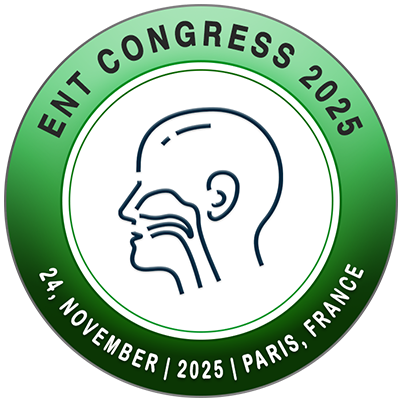
Emma Turner
Bristol Royal Infirmary , UKPresentation Title:
Should hemithyroidectomies be performed as a day-case procedure: A 2-year retrospective review of thyroid lobectomies in a tertiary centre
Abstract
Introduction: Hemithyroidectomy is a common surgical procedure in the UK, traditionally requiring overnight admission due to risks of postoperative haemorrhage and airway compromise. With increasing pressure on NHS resources and growing international support for day-case thyroid surgery, this study aimed to evaluate the safety and feasibility of day-case hemithyroidectomy in a tertiary centre.
Methods: A retrospective review of elective hemithyroidectomies performed between May 2023 and May 2025 was undertaken. Demographics, indications, operative details, complications, return to theatre, readmissions, drain output, specimen volume, and length of stay were analysed. Exclusion criteria included completion thyroidectomy and combined major head and neck procedures.
Results: 122 cases met inclusion criteria (80.3% female, mean age 48.9 years). Indications were primarily suspicious nodules (57.4%) and compressive symptoms (39.2%). The overall complication rate was 17.2%, with 1.6% requiring return to theatre. Postoperative haematoma occurred in 3.3% of patients; only one case (0.8%) required surgical evacuation. Notably, 75% of haematomas presented beyond 24 hours postoperatively. Transient unilateral vocal cord palsy occurred in 5.7% with resolution in most cases; persistent palsy was documented in 1.6%. Mean length of stay was 1.2 days; one patient was successfully discharged the same day without adverse events. No mortality or 30-day readmission was observed.
Conclusion: Hemithyroidectomy at this centre was associated with low complication rates, consistent with published data. While selected patients may be suitable for day-case surgery, the unpredictable timing of postoperative haematoma warrants caution. Larger multicentre studies are needed to refine patient selection criteria and optimise safety in day-case pathways.
Methods: A retrospective review of elective hemithyroidectomies performed between May 2023 and May 2025 was undertaken. Demographics, indications, operative details, complications, return to theatre, readmissions, drain output, specimen volume, and length of stay were analysed. Exclusion criteria included completion thyroidectomy and combined major head and neck procedures.
Results: 122 cases met inclusion criteria (80.3% female, mean age 48.9 years). Indications were primarily suspicious nodules (57.4%) and compressive symptoms (39.2%). The overall complication rate was 17.2%, with 1.6% requiring return to theatre. Postoperative haematoma occurred in 3.3% of patients; only one case (0.8%) required surgical evacuation. Notably, 75% of haematomas presented beyond 24 hours postoperatively. Transient unilateral vocal cord palsy occurred in 5.7% with resolution in most cases; persistent palsy was documented in 1.6%. Mean length of stay was 1.2 days; one patient was successfully discharged the same day without adverse events. No mortality or 30-day readmission was observed.
Conclusion: Hemithyroidectomy at this centre was associated with low complication rates, consistent with published data. While selected patients may be suitable for day-case surgery, the unpredictable timing of postoperative haematoma warrants caution. Larger multicentre studies are needed to refine patient selection criteria and optimise safety in day-case pathways.
Biography
Emma Turner has completed her BMedSci and BMBS degree from the Univeristy of Nottingham, UK. She is currently working as a Clinical Education Fellow in ENT in Bristol Royal Infirmary where she works clinically in the department and for the University of Bristol where is studying for her Masters degree. She has been published previously in BMJ case reports and Plastic Reconstructive Surgery

